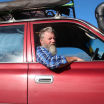Volkswagen Australia has reduced the payload of its Amarok ute range.
But don’t panic, it’s actually good news for a lot of would-be buyers.
The change has come about as VW brings its method of calculating payload into line with the rest of the dual-cab ute industry.
Volkswagen Australia Amarok Product Manager, Ben Triebels, told CarsGuide that the change involves using the kerb weight of the Amarok rather than the tare mass when calculating the payload.
Simply put, this involves weighing the vehicle with a full tank of fuel, rather than the 10 litres of fuel the tare weight method involves. There are no other physical changes whatsoever.
“It’s a simple as that,” Triebels said.

Of course, a heavier vehicle (one with a full fuel tank) reduces payload, but rather than that being a problem for the Amarok, Triebels sees it as an advantage.
“We made the move to bring our specifications into line with what everybody else in the ute market does,” he said.
“But then we had a few dealers and fleet managers contact us and tell us what a great thing the payload reduction was.”
Which begs the question: Why?

It turns out that in the case of many Amarok variants, that slight reduction brings the official payload below 1000kg. At which point, the vehicle is suddenly eligible for a novated lease where, previously, it wasn’t.
Since many high-end dual-cabs are, in fact, user-chooser decisions purchased on just such a leasing plan, this has the potential for a sales uptick for Amarok.
While the Aventura model already featured a payload under 1000kg thanks to its heavier 21-inch wheels and tyres and roller-cover for the bed, the Amarok Core, Style and PanAmericana have now all fallen below the 1000kg payload threshold for novated leasing.






















.jpg)

